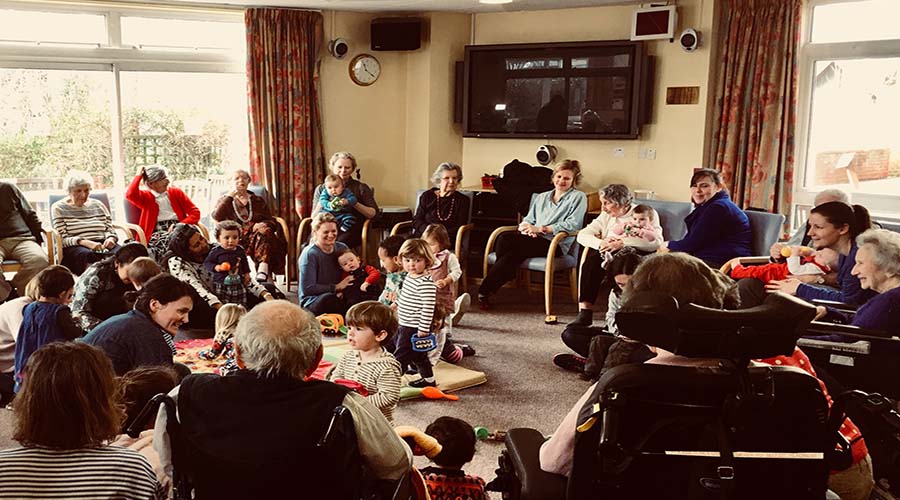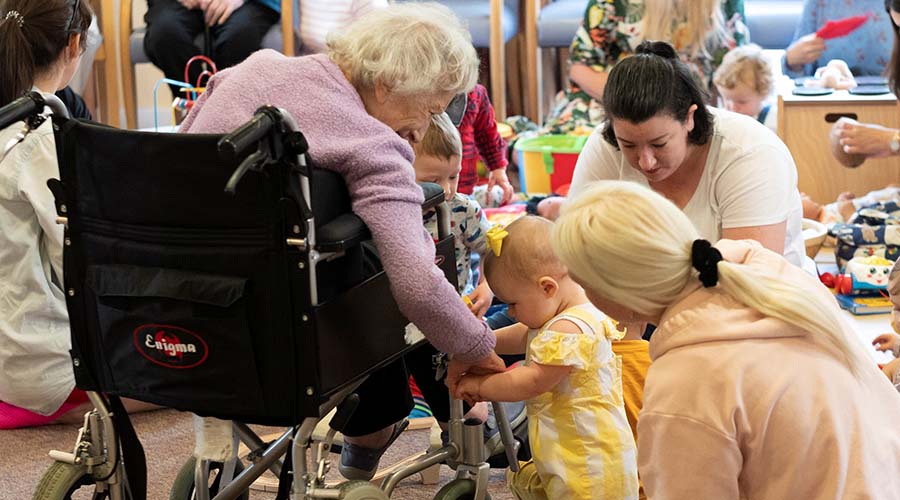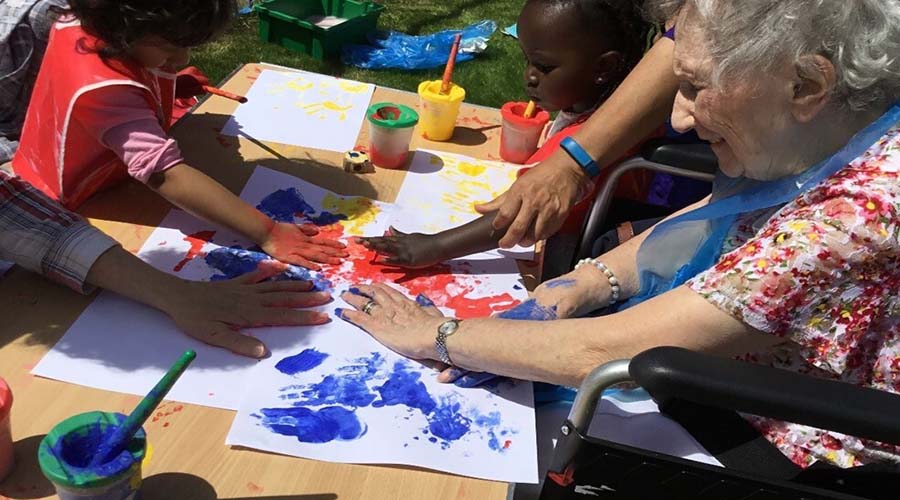settings
children
With Famly since
“It’s not enough that children go to nursery and learn the curriculum, I want them to feel confident and like themselves. It’s so important because if you don’t like yourself, how can you like the world? How can you empathise?” asks Judith Ish-Horowicz.
It was that ethos that inspired Judith to open Apples and Honey, the first Jewish Early Years setting in South London, back in 1991. Judith wanted to support children at her setting to feel like they belonged and were part of the community around them.
As part of celebrating through the Jewish year, Judith explains that the Apples and Honey children would give a gift or do a good deed. In the absence of a Temple to take the gifts to, as they traditionally would have, Judith’s setting took baskets of fruit to the only Jewish care home in South London, Nightingale Hammerson.
But how did bringing baskets of fruit to a care home turn into the UK’s first intergenerational Early Years setting?
I met Judith to find out.
The big ideas
- Intergenerational care home and nursery, Apples and Honey Nightingale, started out as a baby and toddler group. The group still meets to this day!
- While Judith believes that intergenerational care should happen in every care organisation, it has to be quality. Judith's rule is that it has to be purposeful and of equal value to both the children and the residents of the care home.
- Some of the relationships formed at Apples and Honey have lead to families of the children attending 'adopting' new grandparents, creating further links in the Apples and Honey Nightingale community.
Getting started with intergenerational care
At first, the children visited a few times a year, to sing songs and celebrate events in the Jewish calendar. But then Judith observed friendships beginning to form.
“I saw how important it was for not only the children and the residents but the care staff and the families too,” she says. “Some of the children adopted ‘grandparents’ and those relationships continued when the children went to school.”

These relationships inspired Judith to make intergenerational care a core part of her practice and saw an opportunity to bring the children and residents together more frequently.
In January 2017, Judith started a baby and toddler group, which meets to this day in a common room at Nightingale Hammerson care home. The group is open to everyone and the families, with their babies and toddlers, meet once a week to play with the elderly residents.

The experience of running this group meant Judith learned how to provide activities for the children and residents, who the children call Grandfriends, as she went along.
For example, early on with the baby and toddler group, Judith had arranged resources in a circle, with the children in the centre and the residents around the outside, for a play session.
“And it didn’t work. The toys, things like a little cooker and a dolls house, were acting as a barrier between the children and the residents,” Judith says. “But instead, when we moved the toys into the middle, the children began to turn to offer the residents a pretend cup of tea, for example.”
Building up this experience and knowledge of how the children and Grandfriends could work and learn together meant Judith could see first-hand how intergenerational care like this could work on a larger scale.
l value to both the children and the residents of the home. That’s why we launched the Apples and Honey Nightingale Education and Training Centre.”
You can find out more here, under ‘Training’.
Resources recommended by Judith:
- The International Certificate in Intergenerational Practice (ICIP)
- “Growing Together” by Lorraine George - 50 inspiring ideas for intergenerational learning
- The Generations Working Together organisation
Find out more about Apples and Honey Nightingale:
- Judith’s TED talk
- Apples and Honey Nightingale in the news
- Nightingale House from the residents’ perspective
- The Intergenerational Programme at Nightingale House: A study into the impact on the well-being of elderly residents
- The six features of intergenerational care
Working with a residential home
Off the back of her experience with the baby and toddler group, Judith wanted to expand the intergenerational work, so that the children and Grandfriends would be together every day.
But when she actually approached Nightingale Hammerson with the idea of opening a fully functional Early Years setting on their grounds, she didn’t yet have the evidence to back up how successful it would be.
“Everyone can say ‘Oh how lovely,’ but we had to show how it would benefit Nightingale.” explains Judith
To help get the home on board, 20% of the places at the setting are reserved for the children of Nightingale’s staff, at a subsidised rate.
“Having the children of the staff here with their Grandfriends has strengthened the relationship between the staff and the residents.” says Judtih. “It’s helped with recruitment and retention of staff for the home.”
Judith also had to have a bespoke insurance policy created for the intergenerational work, to make sure that they had the cover they needed for this unique type of care.
Finally, in September 2017 Judith opened Apples and Honey Nightingale, within the garden of Nightingale House. The setting has a Jewish ethos, like the care home, but Judith says that Apples and Honey Nightingale isn't just for Jewish children.
“We welcome families of all faiths and cultures. We have so much to learn about each other and share.” she explains.

Why intergenerational care is good for everyone
Judith is passionate about the benefits of intergenerational care and how important it is for everyone.
“I’ve seen children with very difficult home lives, who usually struggle, just blossom with the Grandfriends.” smiles Judith, “The way that they behave with very vulnerable residents is completely different to the way they behave with their peers, which can sometimes be quite aggressive. But they have the opportunity to take on the nurturing role and they rise to it.”
And it’s also transformative for the residents.
“One of the residents is a woman who’s lost her sight, which is very limiting.” says Judith. “She offered to teach the children a French song, as she’s French, so she taught Frére Jaques. Then we sang it in English, and then in Hebrew. She’s continued to teach the children French songs each week. It’s brought her into the group in a new way, as she can’t see what’s going on. She told me ‘I don’t need to see, I hear the children.’ It’s given her purpose.”
Planning for all ages
The children visit the Grandfriends each day, via a short walk across the garden, so Judith and her team have plenty of planning to do.
“Our programmes have to be of equal benefit to the children and the residents.” says Judith, “It has to be accessible and appropriate for everybody that’s taking part. It has to be meaningful and have a purpose. It has to be cognitively, therapeutically, physically and sensorily appropriate for everyone.”
It might seem that to plan activities for groups at essentially the opposite end of their lives would be impossible, but the children and the residents actually have similar needs.
“Craft activities, reading, sequencing, gardening, baking. There’s always something.” says Judith.
The setting and the care home share a Jewish ethos, so the educators also plan for the children and Grandfriends to celebrate festivals and customs together (which is what brought them together in the first place).
“We use the wealth of the Jewish year to create our program and our values,” says Judith, “But they're pretty universal, I don’t claim them from one group of people. But it’s our sense of being in a community, with the Grandfriends, that gives children a very strong sense of who they are and that they belong. Where they fit within the links of generations. Where they fit in time and space.”

Understanding ageing
A fear among many adults, especially those considering an intergenerational programme, is ‘What do we tell the children when someone dies?’
The children at Apples and Honey Nightingale have close relationships with Grandfriends who are very elderly and vulnerable. The average age of entry to Nightingale is 92, and it’s a centre for dementia care and end of life care.
Judith explains that it’s actually this experience of having a relationship with the Grandfriends that supports the children to understand ageing and dying as a natural part of life.
“I think we can overprotect children about the ageing process,” says Judith, “And a lot of it is about how comfortable we are about it. As adults, we put our anxieties about death onto children.”
Instead, Judith and the team don’t shy away from talking about how our bodies age, change, and stop working.
“The children can see our residents ageing and gradually things are stopping to work.” says Judith “We might talk about ‘this person’s legs don’t work very well’, or ‘this person’s eyes don’t work very well anymore’. And they can see their skin is different.”
And Judith says it’s never been a problem yet.
“Usually, as one of the Grandfriends gets weaker, and frailer, they stop coming to the sessions as much, so the children see them less and less.” explains Judith. “We explain that the Grandfriend isn’t feeling well. The children can see that things don’t work so well and we don’t disguise that. It’s natural. If a child asks, you answer honestly. It’s nothing to be frightened of.”
And Judith’s final thoughts?
“Do it. Go for it. It’s phenomenal. It’s been even better and more exciting than I could have imagined. There are no downsides. It’s the best thing you could do, as it helps everyone and it will create societal change. It will make us more into the society we wish to be. It’s giving people a gift.”
Top tips from Alphabet House
Get top tips from a setting just like yours. Hear from Alphabet House on why and how they use Famly - and why they’ve never looked back.
Read their story










